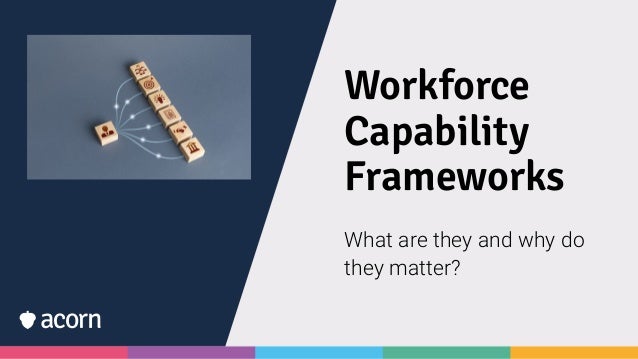
Why You Need A Capability Framework
- 1. Workforce Capability Frameworks What are they and why do they matter?
- 2. What is a capability? A capability is a mix of knowledge, skills, tools, processes and behaviours that combine to deliver an organisational objective. They are usually defined from business outcomes or value streams and then broken down by job role and job family.
- 3. What is a capability framework? A capability framework outlines the skills, behaviours and knowledge required for an organisation’s personnel to achieve business goals. It defines the capabilities that are fundamentally important for an employee to be successful in their role. Capabilities will and should change as your company grows and your goals evolve.
- 4. Why capabilities? Skills can often be portable across organisations, but capabilities and capability frameworks are always contextually unique to your company. They aren’t tied to one team or process either. Your capabilities and capability framework are cross-functional.
- 5. Proficiency A capability framework shows capabilities by levels of proficiency. Proficiencies correlate to a standard of performance expected at a certain level of employment. It’s a matter of progressively increasing capacity and competency.
- 7. Focus capabilities Focus or core capabilities are the main groupings of capabilities within a framework. These are the highest levels of knowledge, skills and attributes employees must possess to effectively perform their roles. Focus capabilities are generally meant to be viewed contextually together to gain a more comprehensive picture of business goals and expectations for employees.
- 9. Reducing risk A sustainable and successful business, company or agency needs a plan that accounts for best- and worst-case scenarios. Reducing and possibly preventing business risk is a core element of capability frameworks. And it’s not just for large enterprises either. Smaller organisations without a HR team can hugely benefit from one too.
- 11. Job Role Descriptions If you have occupation-specific capability sets, managers are able to note the foundational capabilities expected for a certain role without much fanfare.
- 12. Recruitment Frameworks can be used by managers in interviews as a demonstration of potential career growth, and even made public as part of a brand toolkit and employee value proposition.
- 13. Performance Management Effective performance management means managers who can align individual behaviours and motivators with a collective purpose. They also need to be able to measure current performance as an account for future potential.
- 14. Strategic Workforce Planning Smart HR decisions cannot be made without strategically aligned capability framework that provide meaningful context. They provide an accurate metric to assess candidate potential and suitability.
- 16. Better Day-To-Day Performance Many employees don’t know or fully understand what is expected of them. A capability framework is a central source that employees can turn to when they can’t ask others.
- 17. Encourage Self-Reflection Proficiency levels within your framework gives employees markers on which to base their own performance. The ability to reflect on one’s own performance also means less micromanaging is needed.
- 18. Establish Learning Opportunities A capability framework allows employees to seek out opportunities that may be outside their current job scope but have the combined advantage of interesting them and still being of benefit to your company.
- 20. Learning and development Without a capability framework, you could fall into the trap of ad hoc learning and development. Well-managed L&D can deliver the right people with the right skills at the moment of need, now and into the future. To effectively track development against your capability framework, you’ll want to do 3 things.
- 21. Align learning with capabilities Your capability framework should link employees’ personal goals with business objectives. One of L&D’s primary functions is to develop people in a way that supports key business priorities.
- 22. Evaluate learning differences When you factor in capability frameworks for determining learning efficacy, it then becomes a question of whether learning is effectively targeting the capabilities you need to achieve business goals.
- 23. Support skills application 90% of learned knowledge is forgotten within a week. The solution is to reinforce learning on the job, or in the flow of work. Learning pathways, skills registers and capability frameworks are inherently linked by how employees actually implement learning in the workplace.
- 24. You can learn more about this topic by checking out the full article: https://acornlms.com/resources/capabi lity-framework
